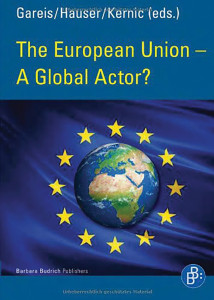Book Editors: Sven Bernhard Gareis, Gunther Hauser
and Franz Kernic
Barbara Budrich Publishers, January 2013
Reviewed by: Alessandro Scheffler Corvaja
 Good handbooks on the European Union’s foreign policy are hard to come by. Many an author has lost himself in endless accounts of summits, declarations and deployments, providing more of a history than a structured analysis of key challenges. When the work is more focused, it often appeals only to EU insiders and provides hard reading for newcomers to the field.
Good handbooks on the European Union’s foreign policy are hard to come by. Many an author has lost himself in endless accounts of summits, declarations and deployments, providing more of a history than a structured analysis of key challenges. When the work is more focused, it often appeals only to EU insiders and provides hard reading for newcomers to the field.
With their volume, The European Union — A Global Actor?, Sven Bernhard Gareis, Gunther Hauser and Franz Kernic are making a particularly welcome contribution to the handbook literature on this subject. The book strikes a golden balance of providing an easily understandable and comprehensive overview of the major issues while at the same time going deep enough to serve as a reference handbook on individual problems for more experienced readers.
The book is split into three parts. Part 1 offers an overview of the history and institutions of European foreign policy, including particularly excellent chapters on the External Action Service and the Common Security and Defense Policy. Part 2 assesses the EU’s relations with important global and regional organizations such as NATO, the Association of Southeast Asian Nations and the United Nations, as well as with regions as diverse as the Maghreb, Latin America and Sub-Saharan Africa. Part 3 addresses current issues such as human rights, counterterrorism, border security and environmental protection. This final section also includes two laudable analyses of the effectiveness of EU sanctions and of the European social model’s attractiveness throughout the world.
The overall question the editors lay out in their introduction is whether EU foreign policy is heading toward that of a “strong political Union” that pursues the common interests of its member states or whether this “Europeanization” will wither in favor of specific national interests. In the latter case, the EU would remain a “loose association” and lend itself to easy division by external actors.
While most other analyses of the EU tend toward either an uncritical appraisal or a harsh dismissal of its foreign policy prospects, this book’s balanced conclusions are of particular merit. To answer the question in the title, the editors clearly show that the EU has become a major actor in global policy. Yet at the same time, the EU continues to struggle with the fact that it is often limited to pursuing whatever minimum consensus its member states can reach.
It is here where the creation of a more effective foreign policy must begin: While institutions can always be improved, it is consensus among member states that really keeps them running. The authors argue for maintaining the Common and Foreign Security Policy’s emphasis on political and economic tools rather than military engagement, thereby maintaining consensus and strengthening this particular brand of “European” power. To achieve this aim, the EU desperately needs a grand strategy embodying this consensus, “clarifying the common goals and objectives as well as determining the joint procedures and adequate instruments to achieve them,” the authors write.
Overall, Gareis, Hauser and Kernic offer an excellent assessment of the major issues facing EU foreign policy. Although its focus on current affairs imposes a limit on the book’s shelf life, readers will gain a good impression of the challenges of our age.
If any criticism is to be made, it would likely refer to the chapter on EU-Russian relations. While the author offers a great — even if not entirely unbiased — assessment of Russian energy policy toward Europe, this is clearly too mono-dimensional a treatment of the complex and multifaceted relations between the EU and its large eastern neighbor.


Comments are closed.